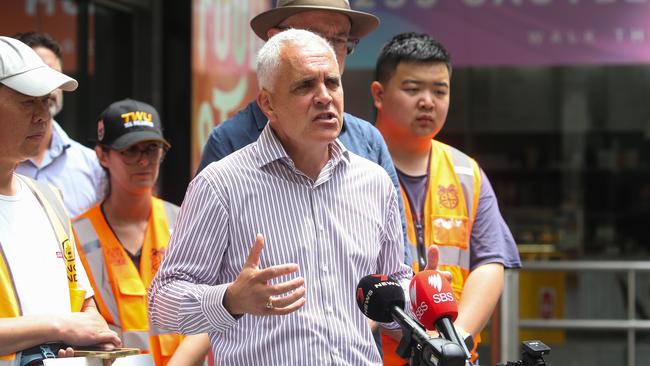Qantas curveball in outsourcing case aims to reduce compensation to next to nothing
A last-minute Qantas move during hearings to determine compensation for unlawfully outsourced workers could see the workers get almost nothing.
An eleventh hour change of strategy by Qantas in its unlawful outsourcing case could result in the affected workers receiving no compensation.
Almost 1700 ground handling employees had their jobs outsourced during the Covid pandemic, in a decision found to be unlawful on the basis Qantas was motivated by a desire to avoid industrial action by the heavily unionised workforce.
In a new submission made just ahead of final hearings to determine what compensation and penalty Qantas should face for the illegal outsourcing, the airline said the decision would still have been made on November 30, 2020 had the unlawful reasons not existed.
The position was different from what Qantas had previously argued, suggesting if the airline had not outsourced in 2020 because of the unlawful reasons, it would have done so in August 2021 when the Delta strain of Covid set back the carrier’s recovery.
The Transport Workers Union disagreed with both scenarios, arguing the legal risk of the outsourcing should have derailed the decision made in 2020.
TWU barrister Mark Gibian told the Federal Court if this had been the case Qantas would not have revisited the plan.
In order to determine an appropriate level of compensation for the affected employees, the court was examining alternative scenarios to determine what the workers might have earned had their jobs not been unlawfully axed.
Mr Gibian told Justice Michael Lee the employees had expected to remain in long-term jobs with Qantas until retirement and should be compensated as such.
Justice Lee asked if that didn’t “fly in the face of reality?”
“I think you have to work on the basis that Qantas was looking after its commercial interests and was trying to cut costs all over the shop and didn’t behave towards it employees, well it wasn’t some sort of altruistic exercise,” said Justice Lee.
“Even if (the outsourcing) didn’t occur in 2021, wouldn’t I have to at the very very least, think about the possibility it would’ve happened at some stage? (Alan) Joyce was there, the documents are replete with the fact he wanted to cut costs.”
“We can talk about likelihoods or percentages but I find it very difficult to believe they would still be working there.”
Qantas barrister Richard Dalton argued there was no way the ground handling workers would still be employed because the outsourcing decision would have gone ahead in 2020 or 2021.
“Would there have been an outsourcing?” Mr Dalton put to the court.
“If the answer to that question is yes, then there’s no loss (of income).”
Justice Lee suggested he was running an “all or nothing case”.
Mr Dalton explained it was preferable to remain as close to the known facts as possible and simply remove the unlawful element of the decision for clarity on what would have happened.
“Simplicity and minimalism is the way to go,” Mr Dalton said.
The new scenario presented by Qantas caused some delay to proceedings early on Monday when the TWU suggested it would prejudice the union’s case for the court to consider it.
Justice Lee said it would be unfair to Qantas if he did not include it and gave the TWU the opportunity to reopen its case and conduct a fresh cross examination of witnesses.
The TWU declined and agreed to continue with final submissions.
As time ran out, Justice Lee made arrangements for a further hearing on May 29 to allow Mr Dalton to complete his submission and for Mr Gibian to have the chance to reply.

The TWU was believed to be hopeful of a penalty in the vicinity of $200m on top of compensation for the workers, including baggage handlers, cleaners and ground crews.
In a separate matter brought by the Australian Competition and Consumer Commission, Qantas recently agreed to a $100m fine plus $20m compensation for customers impacted by the sale of tickets on already cancelled flights.







To join the conversation, please log in. Don't have an account? Register
Join the conversation, you are commenting as Logout